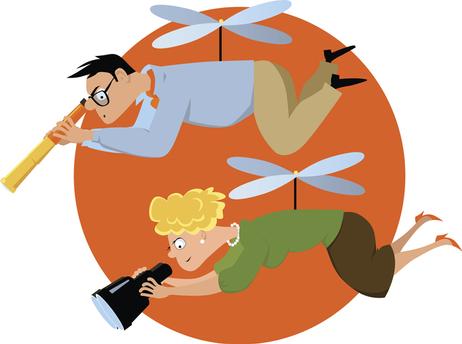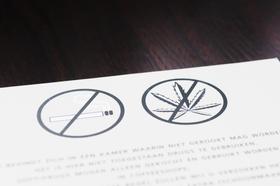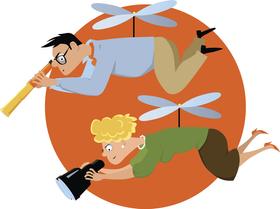Snowplow, velcro, and helicopter really are synonyms describing parents who try very hard to manage their children's lives. While I have written about velcro parents, I was amused and, at the same time, disheartened to discover this new, pejorative term for parents who won't let their kids be stand-alone adults, namely, snowplow parents.
Helicopter parents are real. They exist. You probably even know a couple of them. I encountered a helicopter parent years ago when I was managing a call center in Raleigh, North Carolina. We were interviewing candidates for account manager positions. The candidate in question made it through the screening interview but failed the interview with the sales managers. The next day the candidate's mother showed up in our lobby demanding to know why we would not employ her son. He was 24 years old! Needless to say, she was not successful in getting her son a job with us. I was appalled that a parent would act that way.
As a school teacher, I also encountered my share of what I would describe charitably as concerned parents. At least they kept their distance. My late wife and I acted in the same way with our children's teachers and other adults they dealt with in their daily lives. Yes, we heard tales of woe about Miss So-and-So or heard how mean Mr. S. the soccer coach was. But we kept our distance. We gave advice and guidance. But our kids had to sort things out on their own. Against this backdrop, let's look at these three kinds of parents who cannot seem to let their children stand on their own two feet.
Helicopter Parents
When I wrote about over-protective parents back in June 2016 there weren't too many articles on the subject. Now you have dozens of excellent articles such as 10 Warning Signs That You Might Be a Helicopter Parent (And How to Stop) by Malinda Carlson to introduce you to the subject. I totally understand why many parents are over-protective. That starts with the birth of your child. Suddenly you have this fragile, totally dependent, precious baby in your arms. Unlike most everything else we acquire, my children didn't seem to come with an instruction manual. In those pre-internet days, the only professional guidance we had were books written by Dr. Benjamin Spock and Dr. T. Berry Brazleton Oh, and Sesame Street had just gone on the air, so we had a virtual baby sitter for an hour a day. But that was it.
I will admit that we had all the signs of becoming helicopter parents. For example, Nancy refused to serve our daughters commercial baby food. She prepared their meals ahead of time and froze portions in ice cube trays to reheat at meal time. Of course, we took the usual precautions in child-proofing our home. Things such as locks on the kitchen drawers which contained knives and other sharp instruments, placing cleaning fluids high out of the reach of little hands, and gates at the top of stairs were part of our plan to keep our children protected from accidents. Our common sense approach to parenting included teaching, explaining, and demonstrating how to do things and handle situations. I firmly believe that you have to interact with your children constantly and patiently.
This video from PBS explains how being a helicopter parent may jeopardize your children's health.
Fast forward to the time our children went to pre-school. Socializing your children is another opportunity for you to listen and explain, perhaps even sympathize with your child. But it is also a time to not interfere when they encounter new ideas and ways of doing things which are not exactly the way you had taught them. I remember our eldest daughter's nursery school teacher tell us that our daughter had been upset that morning in school. When the teacher asked what was the problem, our daughter replied with a frown: "The other children are being obstreperous." Our 3-year-old read voraciously and had a vocabulary far beyond her years.
As far as 21st-century helicopter parents go, my advice is "Be watchful but don't interfere most of the time. Be prepared to let go." If that sounds vague, it is by design. We have to know when to interfere for our children's safety and other critical reasons. But we also have to know when to loosen the reins and let our children go. They will learn from their mistakes.
Velcro parents
I wrote The Velcro Parent after reading several news articles about this invidious style of parenting. A New York Times blog describes velcro parents as parents who cannot let go of their children. They are super-involved in their children's lives. The problem with this approach to parenting is that their children will take forever to learn how to cope with the tough decisions and situations which life puts in our path. In his song Bright College Days, the humorist, Tom Lehrer, sang about "sliding down the razor blade of life."
While the song certainly dates me, it does make a point which is something velcro parents need to understand. There are going to be some very rough moments in your children's lives. At those times your role is to be that trusted advisor and friend which they will need. Resist interfering. They really will be ok, just like you were at their age.
Snowplow parents
The term "snowplow parents" started appearing in our feeds after the college admissions scandal broke. These are parents who are determined to remove every obstacle to success from their children's paths.
Claire Cain Miller and Jonah Engel Bromwichba defined snowplow parents as "machines chugging ahead, clearing any obstacles in their child's path to success, so they don't have to encounter failure, frustration or lost opportunities." The snowplow parents who were charged with fraud and arrested in March 2019 for gaming the admissions systems at several highly-selective colleges set a poor example for their children. It makes you wonder what kind of parents these children will become.
In this video, Andrew Blackwood defines snowplow parents.
Are you a "snowplow parent"? Read Nicole Lyn Pesce's article How to tell if you are a ‘snowplow parent’ to see if you fit the description. Nicole also describes several other types of over-protective parents which include the Tiger Parent, the Jellyfish Parent, the Elephant Parent, the Dolphin Parent, and the Free-range Parent.
Questions? Contact us on Facebook. @privateschoolreview























